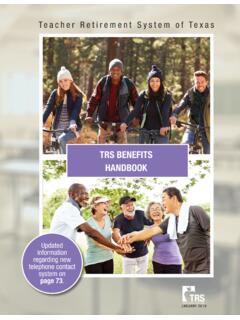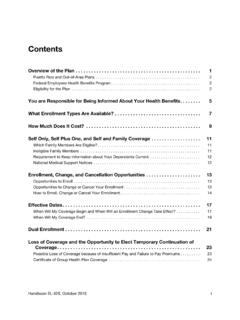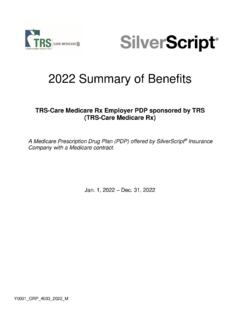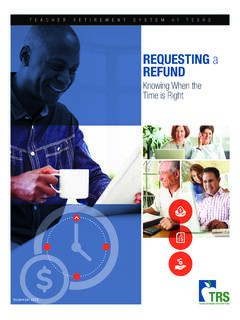Transcription of Many educators in Texas have been misinformed or are ...
1 Many educators in Texas have been misinformed or are unaware of Social Security laws that affect their retirement. The following question-and-answer document presents the facts about Texas educators and Social Security. Will my eligibility for a TRS pension prevent me from collecting Social Security benefits ? No. However, all employees eligible for a government pension such as that provided by TRS who are also eligible for Social Security benefits are subject to two offset rules that can reduce the amount of Social Security benefits they are eligible to receive. The Government Pension Offset (GPO) will affect you if you are eligible for a spousal or widow/er Social Security benefit. The Windfall Elimination Provision (WEP) will affect you if you are eligible for a Social Security pension either from previous employment that paid only into Social Security or from employment in a district that pays into both TRS and Social Security.
2 (Most Texas school districts do not pay into Social Security.) Which Social Security benefits am I eligible to receive? To be eligible for a Social Security pension benefit, you must be at least 62 years old and have a minimum of 40 Social Security credits. A credit is equal to a designated amount of earnings that increases from year to year based on national earnings averages. For example, employees received one credit for every $1,050 of earnings on which they paid Social Security taxes in 2008. Since an employee can earn a maximum of four credits per year, you must have worked in a job in which you paid Social Security taxes for at least 10 years or 40 quarters to meet Social Security eligibility requirements. However, if your spouse is eligible for a Social Security pension, you might be eligible for a spousal or widow/er benefit. Typically, spousal benefits are equal to 37 percent to 50 percent of the spouse s Social Security benefit and are paid to the dependent spouse while the other spouse is still living.
3 Widow/er benefits are usually equal to 71 percent to 100 percent of the spouse s benefit and are paid to the dependent spouse after the other spouse s death. Eligibility is based on age and the number of years married to a qualified spouse. Contact your local Social Security office for complete information on which benefits you are eligible to receive. How will my spousal or widow/er Social Security benefit be affected by my eligibility for TRS benefits ? Texas educators eligible for both a spousal or widow/er Social Security benefit and their own TRS pension benefit are subject to the GPO. The GPO reduces the amount such educators are eligible to receive as a spousal or widow/er Social Security benefit by two-thirds of the amount of their TRS pension benefit. In many cases, this results in a negative amount so these educators do not receive spousal or widow/er benefits . Why does the GPO affect Texas educators ? Social Security spousal and widow/er benefits were created to provide security for people dependent on their spouses.
4 They provide the spouse who does not work with some Social Security benefits based on the other spouse s Social Security earnings. However, if both spouses worked and are eligible for their own individual Social Security pensions, one spouse could still file for a spousal or widow/er benefit even though he or she is not dependent on the other spouse. This is known as dual entitlement. To prevent dual entitlement, the government implemented rules that reduce the amount of spousal or widow/er benefits a person can receive by the amount of his or her own Social Security pension benefit. These dual entitlement rules prevent double dipping, or receiving both a Social Security pension benefit and a spousal or widow/er benefit. However, some government employees, such as Texas educators , work in jobs that pay into government pension programs (such as TRS) rather than Social Security. Because these employees have little or no Social Security-covered employment, it appears that they are dependant on their spouses when in reality they are not.
5 This situation allowed these employees to apply for spousal Social Security benefits without being subject to dual entitlement rules. The GPO was designed to mirror dual entitlement rules and prevent people eligible for a government pension (such as a TRS pension) from receiving a benefit created only for dependent spouses. Is anyone exempt from the GPO? As of July 1, 2004, House Resolution (HR) 743 stipulates that employees who work in a position covered by both Social Security and the government pension system for the last five years before retiring are exempt from the GPO. HR 743 also includes a transitional rule that would allow educators with previous employment in an entity that paid into both Social Security and TRS to count that time toward the five years required to gain exemption from the GPO. For example, if an educator worked three years during her career in a district that paid into both TRS and Social Security, that educator would only have to work her last two years before retirement in a district that paid into both systems in order to receive the exemption.
6 However, the transitional rule cannot reduce the amount of time required to receive exemption from the GPO to less than one month and will only be effective until April 1, 2009. Anyone who applied for spousal or widow/er Social Security benefits before April 1, 2004, can gain exemption from the GPO by working their last day before retirement in a position covered by both Social Security and their government pension system (TRS). Trying to receive exemption from the GPO is a complicated matter that carries a significant risk. It is possible for those seeking exemption to lose accrued benefits such as pay increases, back pay and other incentives by leaving their current jobs. TSTA encourages members to schedule appointments with their local Social Security offices and meet with benefits counselors to investigate their options and situations thoroughly before making any decisions. Can I return to work after retiring from a district that pays into both TRS and Social Security without losing my spousal Social Security benefits ?
7 Yes. You will not lose your spousal Social Security benefits as long as you maintain your status as a retiree under TRS. You can retire and return to work in a TRS-covered position while still maintaining your status as a retiree by following the guidelines for employment after retirement outlined in the TRS benefits handbook . I am eligible for both a TRS pension and a Social Security pension of my own. Which offset rule will affect me? You will be subject to the Windfall Elimination Provision (WEP). How does the WEP work? The WEP affects Social Security benefits for people who are eligible for both Social Security and government pensions (such as TRS) by modifying the formula used to calculate their Social Security benefit. The standard formula for figuring Social Security benefits averages a person s pre-retirement earnings by dividing total pre-retirement earnings by 35 years, then dividing that amount by 12 to find the average monthly earnings (AME).
8 The formula then multiplies the first $761 of the AME by 90 percent. The next $4,586 of the AME is multiplied by 32 percent, and the remaining amount of the AME is multiplied by 15 percent. The three amounts are then added together to determine a person s monthly annuity. The WEP modifies this formula for employees who are eligible for a government (TRS) pension by multiplying the first $761 of the AME by a smaller percentage that is based on the number of years the person paid Social Security taxes on substantial earnings (a designated amount adjusted yearly to reflect economic trends). The percentage increases from 40 percent to 90 percent as an individual s years of substantial earnings increase from 20 years to 30. For example, a person who has paid Social Security taxes on substantial earnings for 20 or fewer years will have the first $761 of his AME multiplied by 40 percent, whereas a person with 26 years of substantial earnings will have the first $761 of his AME multiplied by 70 percent, and so on up to 30 years.
9 Once a person reaches 30 years of substantial earnings he or she is restored to the full 90 percent multiplier and is no longer affected by the WEP. Why does the WEP affect Texas educators ? The Social Security system figures employees incomes based on the total amounts of their Social Security contributions. When figuring incomes in this way, employees such as Texas educators , who work most if not all of their careers in jobs that do not pay into Social Security, appear to have low incomes. The formula used to figure Social Security benefits is designed to provide low-income workers with a larger percentage of their pre-retirement earnings than that provided to high-income workers. The WEP modifies the formula to prevent providing employees, such as Texas educators , who haven t paid into Social Security with a higher percentage of their pre-retirement earnings than that given to employees who have paid into Social Security for their entire careers.
10 Will working my last five years before retirement in a position covered by both TRS and Social Security exempt me from the WEP? No. The exemption rule applies to the GPO only. The only way to be exempt from the WEP is to pay into Social Security for 30 or more years of substantial earnings. If I rescind my TRS membership and withdraw my contributions from TRS so that I will not receive a TRS pension, will I still be subject to these offsets? If you withdraw from TRS before meeting the minimum eligibility requirements for a TRS pension, you will not be subject to the WEP. If you withdraw after meeting the minimum eligibility requirements for a TRS pension, you will be subject to the WEP. You will not be subject to the GPO if you withdraw from TRS, regardless of whether or not you meet the eligibility requirements for a TRS pension. However, you will only be able to withdraw your own contributions plus interest and not the contributions made by the state on your behalf.




